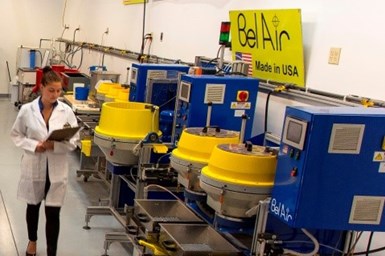Phillips Federal Adds Bel Air Finishing Technology
Bel Air Finishing's post processing technologies will support Phillips' Public Private Partnership, providing training for finishing for 3D printing.

Phillips Federal (Hanover, Md.), a division of Phillips Corporation, has added Bel Air Finishing’s post processing technologies to support its Public Private Partnership (P3) and additive manufacturing programs at Rock Island Arsenal (RIA).
Bel Air and Philips have combined to install a cell for post processing of all types of metal and plastic additive manufactured components. The operational system will be used as a training facility for U.S. Army and private contractors involved in 3D printing around the world.
The Bel Air team looks forward to working with Phillips to teach the various technologies of post processing for additive manufacturing. The training facility aims to make printing more efficient and improve quality.
The cell includes automated build removal, surface grinding, polishing, cleaning and its own closed loop water feed system. Bel Air personnel will bring their 50+ years of experience, joining Phillips to be part of numerous scheduled training workshop presentations. Get more information here.
Related Content
-
Videos: 40 Under 40 Class of 2024
In these uncertain times, it is refreshing to hear from and learn about young talent in the surface finishing industry who are striving to make a difference within their organizations and the industry as a whole.
-
Take Advantage of Finishing Industry Educational Opportunities
Looking into training opportunities within the industry? Here’s some advice to help you seek out finishing industry education and make the most of it.
-
AkzoNobel Uses VR for Training Airline Apprentices
The virtual reality technology provides a paint booth and spray gun that enables trainees to work and master their skills without losing parts in the process.

.JPG;width=70;height=70;mode=crop)











